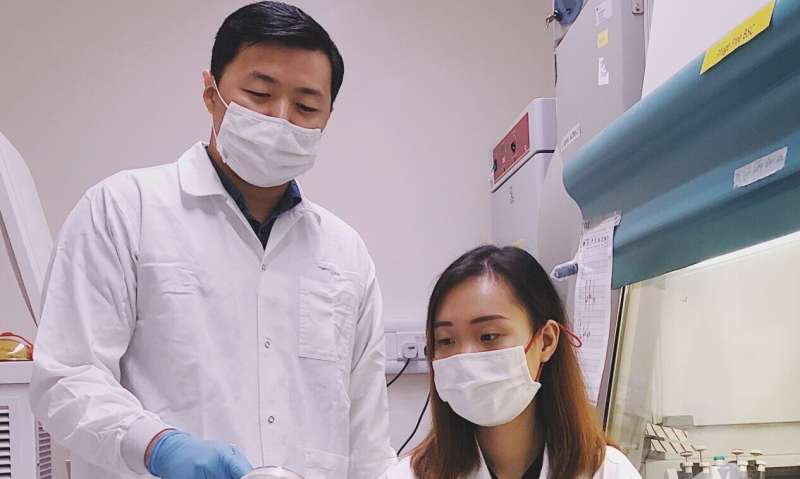Researchers develop customized targeting of bacteria using lysins

Researchers from the Antimicrobial Resistance (AMR) Interdisciplinary Research Group (IRG) at Singapore-MIT Alliance for Research and Technology (SMART), MIT's research enterprise in Singapore, have developed a method to produce customisable engineered lysins that can be used to selectively kill bacteria of interest while leaving others unharmed. The discovery presents a promising alternative to antibiotics for treating existing drug-resistant bacteria and bacterial infections without the risk of causing resistance.
Lysins are enzymes produced by bacteriophages to break open the bacteria cells while treating infections, and have demonstrated potential as a novel class of antimicrobials. A major advantage of lysins is that they allow fast and targeted killing against specific bacterium of choice without inducing resistance.
The emergence of multidrug-resistant bacteria has left even minor bacterial infections incurable by many existing antibiotics, with at least 700,000 deaths each year due to drug-resistant diseases according to the World Health Organization.
In a paper titled "Engineered Lysins with Customized Lytic Activities Against Enterococci and Staphylococci," recently published in Frontiers in Microbiology, the SMART AMR team demonstrates one of the methods to customize the lytic spectrum of engineered lysins.
The study reveals how SMART's engineered lysins were able to selectively kill bacteria like Staphylococci, Enterococcus faecalis, while leaving the Enterococcus faecium bacteria of the same genus unharmed. This is the first report of a chimeric lysin that can both target bacteria of multiple genera as well as selectively kill one bacterial species within a genus over another.
"The human body contains trillions of bacteria, which form the microbiome, and the majority of the bacteria is either harmless or beneficial to us," says AMR Research Scientist and corresponding author of the paper Dr. Boon Chong Goh. "What happens when we are on an antibiotic course is that the antibiotics kill all of the bacteria, leaving us vulnerable to a worse re-infection after we have completed the antibiotic course. Since lysins respect the microbiome and only eliminate the bad pathogenic bacteria, they are a very promising alternative for treating bacterial infections."
Awarded with the Ignition and Innovation Grants from SMART Innovation Center, Dr. Goh's team has established the foundation of a technology platform by producing the lysins and testing them in vitro, and are in the process of developing a series of techniques to engineer the lysins.
"Since lysins are essentially proteins, they can be engineered and mass produced," says Ms. Hana Sakina Bte Muhammad Jai, lead author of the paper and Laboratory Assistant under Dr. Goh's team at SMART. "Our study clearly shows how modifying these proteins translates to improvements of their specificity and antibacterial activities"
"In the lab, we have observed that once a small amount of lysin is added, it only takes 30 minutes to completely kill the bacteria making them a very safe and efficient choice for removing unwanted bacteria," says Ms. Linh Chi Dam, the co-first author of the paper and Laboratory Technologist under Dr. Goh's team at SMART. "While developments in the production of customized lysins would greatly impact pharmaceutical industries where lysins can be used to treat bacterial infections, skincare and consumer care industries would also benefit by using lysins as a targeted agent to remove unwanted bacteria from their products."
The research is carried out by SMART and supported by the National Research Foundation (NRF) Singapore under its Campus for Research Excellence And Technological Enterprise (CREATE) program. The SMART AMR team was also recently awarded the Intra-CREATE Seed Collaboration Grant to investigate lysins targeting Gram-negative bacteria such as, Pseudomonas aeruginosa, Acinetobacter baumannii, and Klebsiella pneumoniae.
More information: Hana Sakina Binte Muhammad Jai et al. Engineered Lysins With Customized Lytic Activities Against Enterococci and Staphylococci, Frontiers in Microbiology (2020). DOI: 10.3389/fmicb.2020.574739
Journal information: Frontiers in Microbiology



















